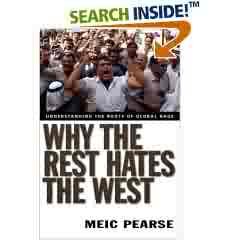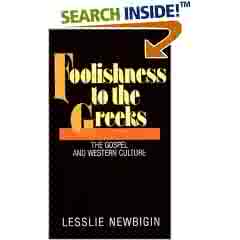
EMERGING CULTURE, EMERGING CHURCH, AND EMERGING SPIRITUALITIES:A Conversation with Ryan Bolger
Western culture is experiencing a significant cultural shift from modernity to postmodernity. Various social and spiritual movements have arisen in response to this cultural change. As one response, the emerging church movement has arisen within evangelicalism. This movement is distinctly different from both the contemporary church and seeker church movements, as well as traditional expressions of church. Postmodernism has also given rise to various expressions of new religions and alternative spiritualities. Ryan Bolger is a leading thinker and evangelical strategist in the area of contemporary culture and missions. Ryan is Assistant Professor of Church in Contemporary Culture at Fuller Theological Seminary. Along with Eddie Gibbs, he is the co-author of Emerging Churches: Creating Christian Community in Postmodern Cultures (Baker Academic, 2005). Ryan was gracious enough to agree to an interview for this blog on important issues facing the church in the Western world. (Photo: Ryan Bolger [left], Eddie Gibbs [right]).
MoreheadsMusings: Can you tell us about your background and your perspective of research and analysis related to the emerging culture?
Bolger: Hi John, thanks for hosting this conversation. I’m a native southern Californian – have lived in other places but always find my way back to LA. I’ve studied missiology, specifically mission to the west, under Wilbert R. Shenk, a student himself of Andrew Walls and less formally, of Lesslie Newbigin. In addition, I studied the church and church growth under Eddie Gibbs, the Donald McGavran Professor of Church Growth at Fuller Theological Seminary. It is at Fuller where I received a PhD in missiology. What I learned is that we need to think like missionaries in the West rather than simply as church members. We need to understand the culture and look to foster indigenous faith communities within that same culture. Again, nothing radical for missionaries, but very radical for the Western church. As I look at the West, I am most interested in those communities that engage the culture seriously, as missionaries do. I want to tell their stories in the hopes that it might inspire others to do likewise.
MM: How would you summarize postmodernity in Western culture?
Bolger: Modernity involved the birth of the secular project in the West – the loss of tradition, community, and the centrality of faith. Inherent to modernity is individualism, industrialization, the birth of the powerful state, the fragmentation of societies, to name a few. Postmodernity marks a significant change in all these realms. It marks the end of the secular project of modernity and the re-integration of spirituality and community into public life.
MM: Is it important to make such a distinction between academic postmodernism and postmodernism as expressed on a popular level, and where have evangelicals tended to focus their discussion and critique?
Bolger: I’m concerned with the social manifestations of postmodernity, not necessarily the arguments within the philosophical tradition. So, my interests are academic, but the parallels between the academy and the popular level are more obvious when you focus on the social realm. I do think there are parallels with the philosophical realm as well, but the connections are more difficult to demonstrate. Church-type evangelicals are taught to interact with culture based on philosophy, and so they will think in terms of an apologetic response to postmodernity, addressing issues such as the move away from foundationalism. Mission-type evangelicals will look to understand the culture -- not necessarily debate the culture. For missionaries, cultures just are. Missionaries do not look to change the culture as outsiders, but rather, after fostering an indigenous faith community from within, they may look to the new converts to transform the culture.
MM: Is postmodernism something evangelicalism and mainline Protestantism should carefully consider as a cultural development for broader reasons beyond the issues of epistemology and absolute truth?
Bolger: Definitely – postmodernity represents a new form of culture in our cities, connecting our artists, our spiritual people, our environmentally minded, and our youth. This is where evangelicals make their big mistake – thinking we need to argue with these people. We need cross-cultural mission training for regular Christians. Unless they have gone to the mission field, they just don’t have these sensibilities. They spend their time arguing from the outside rather than helping foster transformation from within.
MM: Let’s talk about the emerging church movement. What is it, and how does it differ from the contemporary church or seeker sensitive models?
Bolger: Emerging churches represent the first post-Christendom movement in Western clture. Christendom churches are attractional, meaning they look to attract people to their church within a churched culture, and this includes movements such as seeker churches, purpose-driven churches, Calvary Capels, Vineyards, not to mention all the traditional denominations. Post-Christendom churches do not see the church service as a primary connecting point with non-Christians. They look to embody their alternative way of life in the midst of the people in the culture – not in the church service. Again – not radical for missionaries but very counter-cultural within historically churched cultures such as the West. Emerging churches look to the life of Jesus as a source of life – not just his death and resurrection. So, hospitality, generosity, inclusion of the marginal, peacemaking, are very important to emerging churches. Emerging churches are truly postmodern – thus, they do not believe in secular space. They believe in spirituality in all realms, in all parts of culture, with all parts of culture, and with all kinds of people. For emerging churches, community is the glue – they would rather be a part of a community that had a service than a church service in hopes of creating a community.







